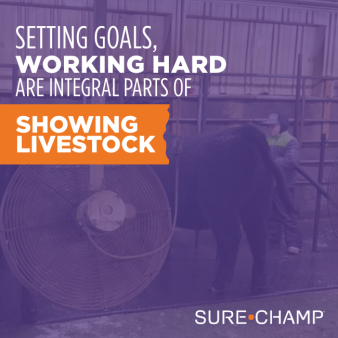By, Rhonda McCurry
Sometimes you have to get down to business.
In the livestock world, there are many opportunities to focus on a segment of the industry you most enjoy. But, once a degree is earned it might also be necessary to know how to run an actual business.
Whether a person majors in communications, economics, engineering or animal science, being able to manage the company books, comprehend financial statements and focus on accounts receivable and income are essential parts of running a business. This is also why earning a business minor can accentuate a bachelor’s degree and put a person on the path to being a good business owner.
David Lehman, instructor in the department of marketing at Kansas State University, says business courses can only help a young entrepreneur. It’s essential in the work world he says, to understand accountant-speak and make sure the questions asked from a CPA are thorough and helpful to meet business goals.
Agriculture sales jobs can provide great careers and Lehman says even this industry group it is important to have business savvy. For example, talking to prospective customers at a trade show about the marketing aspect of their company and being able to talk about operations-oriented aspects of a company can both help complete the sale.
In the ag manufacturing world, developers must make products that meet the needs of other businesses. Business courses could help the owner be more profitable and efficient, while pushing their product in front of the ag world.
Lehman says these days if a student doesn’t major in business they should consider a minor in it instead. At K-State, students can earn a business minor by completing five courses for a total of 15 credit hours. These five courses are the first two accounting courses then introductory courses in finance, marketing and management. There is no minimum GPA requirement to earn a business minor at K-State and Lehman says the difference between a major and a minor in business is huge.
“I’d say most students who are business minors have an advantage in the job market,” Lehman says. “When you put on your resume that you are also learning finance, marketing and accounting management it can be helpful. Plus industries outside of ag are attracted to business minors.”
Lehman says when an applicant puts in for a job they should want to set themselves apart from the others, to appear different. Adding a business minor to an agriculture degree shows uniqueness, he says. One example is a current student he works with who is a food science major at K-State. The student is also acquiring a business minor and working toward his dream job of working for Frito-Lay.
“Most often people think of food science majors as people in white lab coats, but tack on a business minor and it’s a way to get noticed,” he says. “A business minor can help the potential employee by showing this student can do more and also talk to people, not just be a food scientist.”
Often a student may be only a few credit hours away or have already taken the right courses to earn a business minor. Lehman says to pay attention to these requirements and be sure to apply for the business minor, not just assume it will be awarded if all the coursework is incidentally taken.
He says adding a business minor is popular right now for ag communications and agronomy majors at K-State. Adding business coursework can also give a student an advantage when it comes to starting salaries. Because the initial salary for a person fresh out of college can have huge implications for their future earning potential and retirement savings, anything that can be done to get a higher-paying job initially is smart. Getting a business minor, Lehman says, could add that opportunity.
Ultimately, Lehman says the extra hours of business education can help a student stand out among the most popular jobs, which could have hundreds of applicants. Most students focus on earning their major in a chosen field and simply don’t worry about a minor. But, in today’s strong job market, Lehman says he encourages his students to go for it.
“Agriculture is a business,” Lehman says. “Whether you’re a farmer or raising livestock or working for an ag business firm these are all very special types of businesses. We don’t want to forget that.




